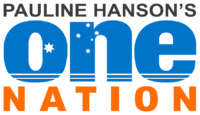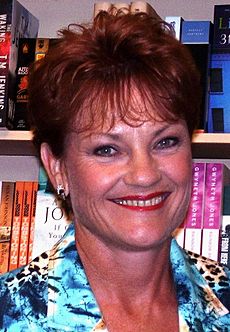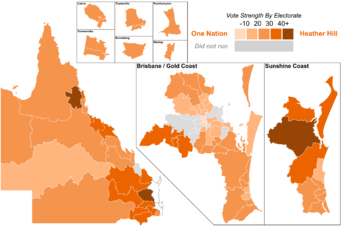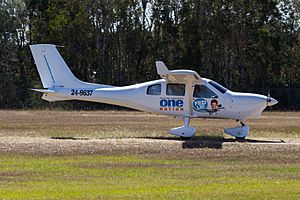Pauline Hanson's One Nation facts for kids
Quick facts for kids
Pauline Hanson's One Nation
|
|
|---|---|
 |
|
| Abbreviation |
|
| President | Pauline Hanson |
| Founded | 11 April 1997 |
| Registered | 27 June 1997 |
| Headquarters | 2/6-12 Boronia Rd, Brisbane |
| Ideology |
|
| Political position | Right-wing to far-right |
| Colours | Orange Blue |
| Party branches |
|
| House of Representatives |
0 / 150
|
| Senate |
4 / 76
|
| State and territory lower houses |
0 / 465
|
| State and territory upper houses |
3 / 156
|
| Seats in local government | |
|---|---|
| Brighton (Tas.) |
1 / 9
|
| Clarence (Tas.) |
1 / 12
|
| Lake Macquarie (NSW) |
1 / 13
|
| Campbelltown (NSW) |
1 / 15
|
| Cessnock (NSW) |
1 / 13
|
| Victor Harbor (SA) |
1 / 10
|
| Mount Barker (SA) |
1 / 11
|
| Esperance (WA) |
1 / 9
|
Pauline Hanson's One Nation (also known as One Nation) is a political party in Australia. It is led by its founder, Pauline Hanson. The party is known for its nationalist and populist ideas, which means it focuses on promoting Australian interests and appealing to ordinary people.
One Nation was started in 1997 by Pauline Hanson and her advisors, David Ettridge and David Oldfield. This happened after Hanson, who was a candidate for the Liberal Party of Australia, was disendorsed (or dropped) by her party before the 1996 federal election. She was disendorsed because of comments she made about Indigenous Australians. Hanson won the election as an independent and served for a year before officially creating the One Nation party.
The party was very successful in the late 1990s but then went through a period of decline. It made a comeback in the 2016 federal election, winning four seats in the Senate, including one for Hanson. As of 2025, the party holds four seats in the Senate.
One Nation's platform is generally conservative. The party has strong views on topics like immigration and globalisation. Some critics have called the party's policies racist and xenophobic (disliking people from other countries), but the party disagrees with these labels.
Contents
History of the Party
1997: One Nation is Born

After being elected to Australia's federal parliament, Pauline Hanson started the One Nation party with her co-founders. The party was officially launched on April 11, 1997, in Ipswich, Queensland. It was registered as an official political party a few months later.
1998: First Elections and Big Success
The party's biggest success came in the 1998 Queensland state election. One Nation won 11 seats in the Queensland Parliament, which surprised many political experts. They received almost 23% of the total vote, which was a very high number for a new party. Most of their support came from people living in country and rural areas of Queensland.
However, this success didn't last long. Within a year, some of the elected members left the party. At the 1998 federal election, Hanson lost her seat in parliament. The party did win one Senate seat, which was first held by Heather Hill and later by Len Harris after a court challenge.
Internal Disagreements and Challenges
The party faced many internal problems and disagreements. Co-founder David Oldfield was expelled from the party by Hanson in 2000 after a public argument. He then started his own version of the party, called One Nation NSW.
There were also legal challenges about how the party was registered. These challenges claimed that the party did not follow the rules for registration. This led to court cases and a lot of media attention. Although Hanson faced serious accusations, she was eventually cleared of all charges on appeal.
2004–2013: A Period of Decline
After the early 2000s, the party's support from voters dropped significantly. In the 2004 federal election, One Nation lost its only Senate seat. For many years, the party had very few elected members in any parliament in Australia. By 2009, after Rosa Lee Long lost her seat in Queensland, the party had no members in any state or federal parliament.
2013–2015: Hanson's Return as Leader
Pauline Hanson returned to lead the party in 2014. She ran for a seat in the 2015 Queensland state election and came very close to winning, losing by only 114 votes. Her return brought new energy to the party. In 2015, she announced the party would use its original name, "Pauline Hanson's One Nation," for the next federal election.
2016–present: Return to Federal Politics
The 2016 federal election was a major comeback for One Nation. The party won four seats in the Australian Senate. Pauline Hanson was elected as a senator for Queensland, along with Malcolm Roberts (Queensland), Brian Burston (New South Wales), and Rod Culleton (Western Australia).
However, the party continued to face challenges with its members. Over the next few years, several senators left the party or were found to be ineligible to be in parliament.
- Rod Culleton was removed from the Senate in 2017 because of a court ruling. He was replaced by Peter Georgiou.
- Malcolm Roberts was also found to be ineligible in 2017. He was replaced by Fraser Anning, who left the party almost immediately. Roberts later returned to the Senate in the 2019 election.
- Brian Burston resigned from the party in 2018 to sit as an independent.
Notable Events
In 2017, Hanson wore a burqa (a full-body covering worn by some Muslim women) in the Senate. She did this to call for the clothing to be banned in Australia. Her action caused a lot of shock and was criticised by many other politicians.
In 2018, former Labor Party leader Mark Latham joined One Nation and became its leader in New South Wales. He was elected to the state's Legislative Council in 2019.
In 2019, a documentary by news channel Al Jazeera showed One Nation officials meeting with gun-rights groups in the United States. The party said the documentary was a "hit piece" and reported it to Australia's security agency.
Recent Years
One Nation has continued to be active in Australian politics.
- In the 2022 federal election, the party ran candidates in almost every seat.
- The party won its first-ever seats in the South Australian parliament in 2022 and the Victorian parliament in 2022.
- In 2023, the party campaigned strongly against the Indigenous Voice to Parliament referendum, which was ultimately defeated.
- In 2025, the party had a successful result in the 2025 Western Australian state election, winning two seats in the state's upper house.
- At the 2025 Australian federal election, the party increased its Senate representation to four seats.
What Does One Nation Believe In?
One Nation's ideas are often described as nationalist and conservative. This means the party wants to protect Australia's culture and interests first.
Key Ideas and Policies
- Immigration: One Nation supports reducing the number of immigrants coming to Australia. The party wants to make sure that new immigrants fit in with Australian values. It has been described as anti-Islam because of its calls to ban immigration from certain countries.
- Economy: The party supports protectionist policies, like putting taxes on imported goods to help Australian businesses. It is against foreign ownership of Australian land and companies.
- Australian Values: One Nation believes in "one law for all Australians" and is against different legal systems for different cultural groups.
- Climate Change: The party is skeptical about the science of climate change and wants Australia to withdraw from international climate agreements.
- Government: One Nation wants to give more power to citizens through referendums (public votes on laws). It has also called for a review of politicians' salaries.
Who Votes for One Nation?
Historically, One Nation has been most popular with voters in rural and regional areas, especially in Queensland and parts of New South Wales. Many of their supporters are working-class people who feel that the major political parties have forgotten them. These areas often have economies based on industries like coal mining.
Election Results
One Nation's success in elections has gone up and down over the years.
- Federal Elections: The party's best result was in 1998, when it received over 8% of the vote for the House of Representatives. After a long period of low support, its vote increased again from 2016 onwards. In the 2025 election, the party won 6.4% of the vote in the House of Representatives and gained two new Senate seats.
- State Elections: The party's biggest victory was in the 1998 Queensland election, where it won 11 seats. Since then, it has won seats in the parliaments of Western Australia, New South Wales, Victoria, and South Australia at various times.
Images for kids
See also
 In Spanish: Una Nación de Pauline Hanson para niños
In Spanish: Una Nación de Pauline Hanson para niños
- Hansonism
- Conservatism in Australia
- Pauline Hanson's One Nation – South Australia
- Pauline Hanson's One Nation – New South Wales
- Pauline Hanson's One Nation – Queensland
- True Blue Crew, a far-right group whose members have been involved with Pauline Hanson's One Nation
- New Zealand First, similar party in New Zealand.
- Personalist party

















